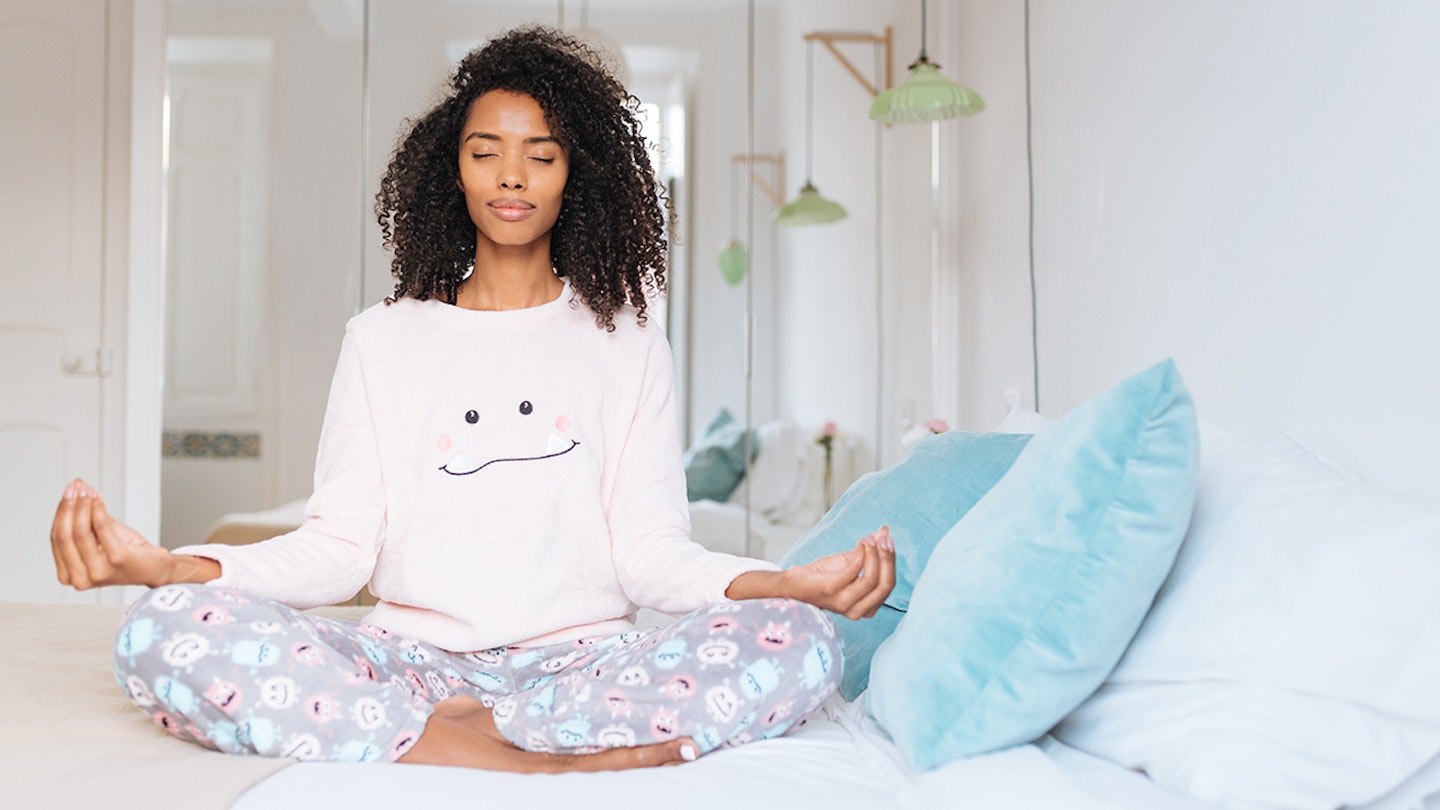There are several different things you might try when you can’t sleep: a bedtime story, a sleep app or even a pillow spray. But have you thought about introducing mindfulness to help you sleep?
A study found that when a group of people completed a mindfulness awareness program that taught them meditation and other exercises to help them focus on “moment-by-moment experiences, thoughts, and emotions”, they experienced less insomnia, fatigue, and depression.
But what exactly is mindfulness for sleep? And how can it help? We spoke to Karen Heras-Kelly, Certified Life Coach & Meditation Expert from A Tribe Called Woman to find out more.
What is mindfulness?
You may have heard of mindfulness meditation or mindfulness colouring but if you're not familiar with mindfulness generally, it's worth understanding what it is first. "Mindfulness is an ongoing practice of going within, tuning into each moment and not indulging in stories from the past or projections into the future," explains Karen. "It requires awareness, focus and consideration, where do you want to put your attention? Mostly, it happens during meditation by sitting or lying silently and focusing on your breath and becoming aware of thoughts, sounds and sensations."
"That said with practice, you can find mindfulness in any activity because it is about coming back to this moment and tuning into what’s happening inside you, and then making a conscious choice to focus your body, mind and breath. Ultimately, when your mind starts to wander, you practice refocusing on here, now and this breath."
If you could use a little help getting into the zone, Karen has a great suggestion: "To support a mindfulness practice, you can download a mindfulness bell chime onto your phone and set a chime to ring every 30 minutes, the chime is a wake-up call to come back to being mindful and refocusing your thoughts/mind back to the present moment, where life is really happening."
This is a great way to introduce mindfulness into your day-to-day life, you could even start meditating at work.
Why is mindfulness for sleep helpful?
So now you know what mindfulness is, how can you use to help send you snoozing? "A tired mind can be tricky to navigate because this is often when the inner critic or saboteur is at its strongest," says Karen. "Your saboteur is like a bully, it wants you to feel disempowered and when your reserves are falling short (e.g. at the end of the day), this is the time it tends to be at its most vocal. We have all been there, we jump into bed after a long day, feeling tired and then our mind seems to wake up, and we start overthinking our day, worrying about what seemingly didn’t go to plan and obsessing about the next day."
"Making mental lists, having conversations in our heads and role playing are all the work of an overactive and often tired mind, we allow this to happen because we believe we are able to control life with our minds; however, this is fundamentally untrue," Karen explains. "Knowing that we are not fundamentally in control of everything that happens in our life is actually a gift because it teaches us to surrender to the mystery of life and make peace with our journey. Mindfulness and meditation are essential tools that help body, mind and spirit relax and connect."
How to calm your mind for sleep

Lots whirling around in your brain? Karen explains how you can empty your mind for sleep:
1. Finish off your day
Think about where you want to put your focus and energy, and what you want to consume as you prepare for sleep. Going to bed is the final transition in your day and it can be a celebratory and sacred experience. Create mini practices that have meaning and soul for you; light a relaxing candle, take a soothing bath, adopt positive self-talk that acknowledges you for your efforts that day.
2. Release tension
Try a simple tense and release exercise to release any tension that has been stored up in the day, work through your body from head to toes and imagine that each body part or organ is tensing and then relaxing. Where you can feel the muscle or body part, physically tense and then let go.
This is amazing for soothing the body and letting it know that it is time to relax, and a relaxed body sends signals to the brain that it is safe to let go. Then start to breathe easily and deeply, paying attention to the feeling of air as it enters and leaves the nostril and body. Follow the in and out motion of your breath.
I work with a simple heart focused breath, breathing into the heart for a count of four, with a small pause and then letting go of my breath on the exhale for the count of four, a small pause and then bringing in the next breath. Imagine that your heart is expanding, opening and growing as you breathe; this is a self-soothing exercise that eventually rocks you to sleep.
3. Let go of clutter in your mind
If your mind is still active, imagine that every thought is leaving the crown of your head like a smoke signal up into the sky, it is now gone.
Another idea for busy bees is to write all your thoughts down in a freestyle manner into two pages of A4 before you settle down for sleep, just allow everything to flow out onto the page and see this as a mind emptying exercise that will support you to rest.
4. Tune into your senses
"Think about touch and smell, so lavender and frankincense are good for relaxing and keeping airways open," says Karen. "You can rub some essential oils onto your hands and then cover your nose with your hands, breathe in slowly and allow your senses to open. Rubbing oils into your pressure points (behind wrists and on your temples) is also helpful."
"Also tune into your other senses, can you hear birds singing? Allow the sound to grow on the inside of your awareness, feel the song as it is being sung. This will steer your mind away from overthinking and send signals that all is well, it’s time to drift off etc."
You can play gentle music as you start to wind down. Another good practice is to minimise screen time 1-2 hours before bed.
5. Focus on a positive word or sentiment
Work with a mantra, “all is well in my world,” and repeat this over and over again as you follow your breath. The repetition is very soothing.
"If you consider what quality you would like to receive (and give more of) in your life today, then you can build this into your nightly routine," recommends Karen. "'I am love and loved' is a good one if you are looking to express and receive more love in your life. It is helpful to imagine that the quality is already present in your life and affirm its blessing with the mantra/statement or words you choose. You do want to focus on your feelings too, build the feeling of love inside your body because this will create a warm feeling that is a great antidote for fear/anxiety."
Resources to explore
If you're interested in finding out more ways to help encourage mindfulness for sleep, Karen suggests looking into the following:
• Activities that work well with mindfulness such as: yoga, yoga nidra, tai-chi, chi-gong, walking, any nature related activity or slower paced activity that develops awareness of your breathing
• Chopra
• There are also a range of videos on YouTube offering guided meditation for sleep, so you can find what works best for you.
The meditation session below is intended to help you fall asleep, and also sleep more deeply and comfortably so you can wake up feeling refreshed and ready for a new day. Listen at night as you lie in bed, wearing comfortable headphones or earbuds.
